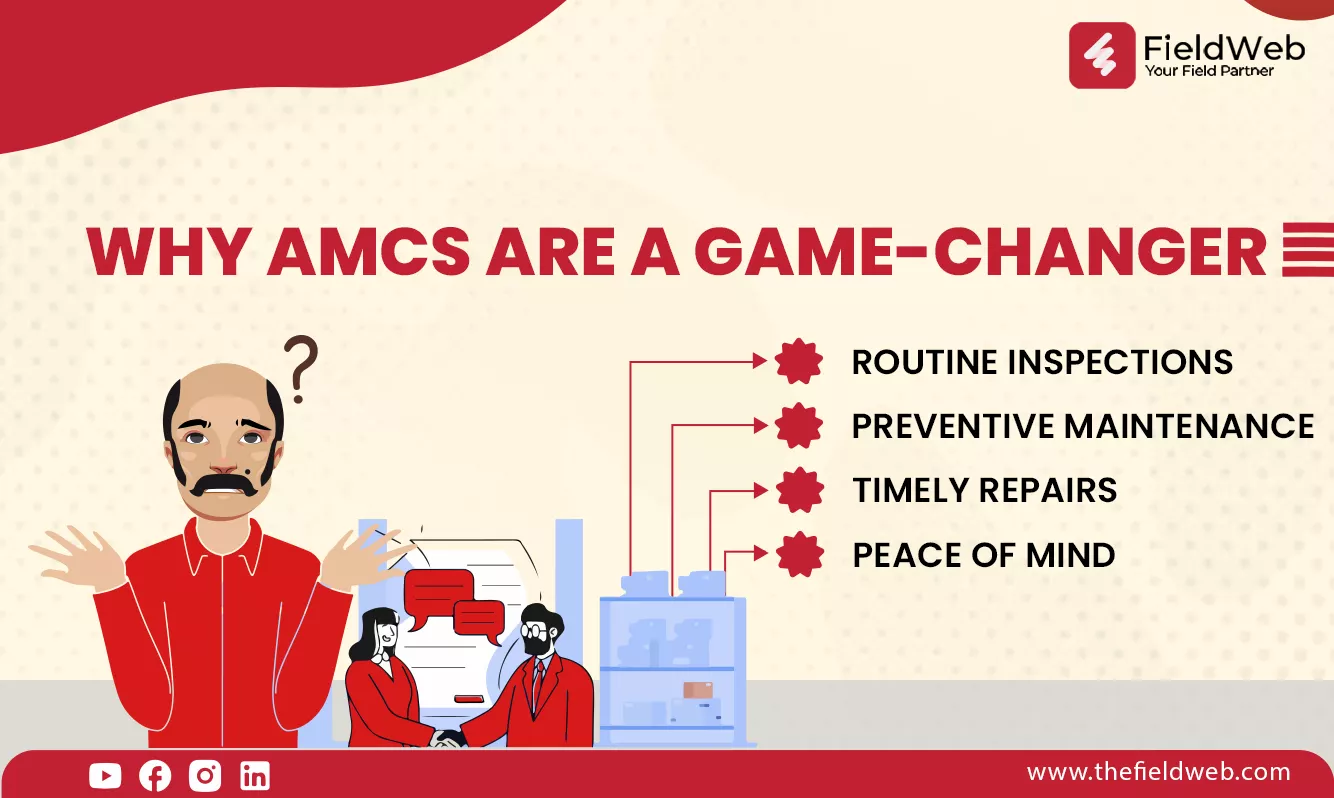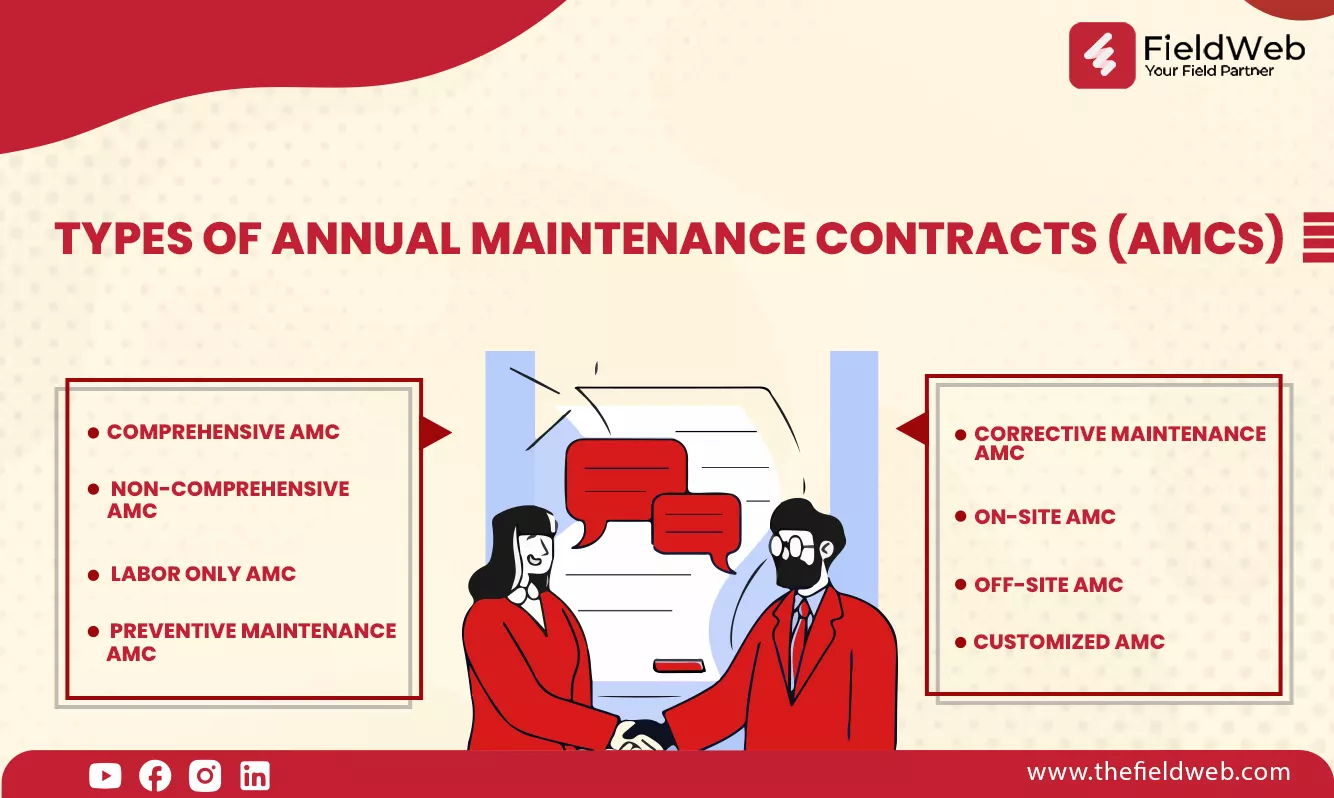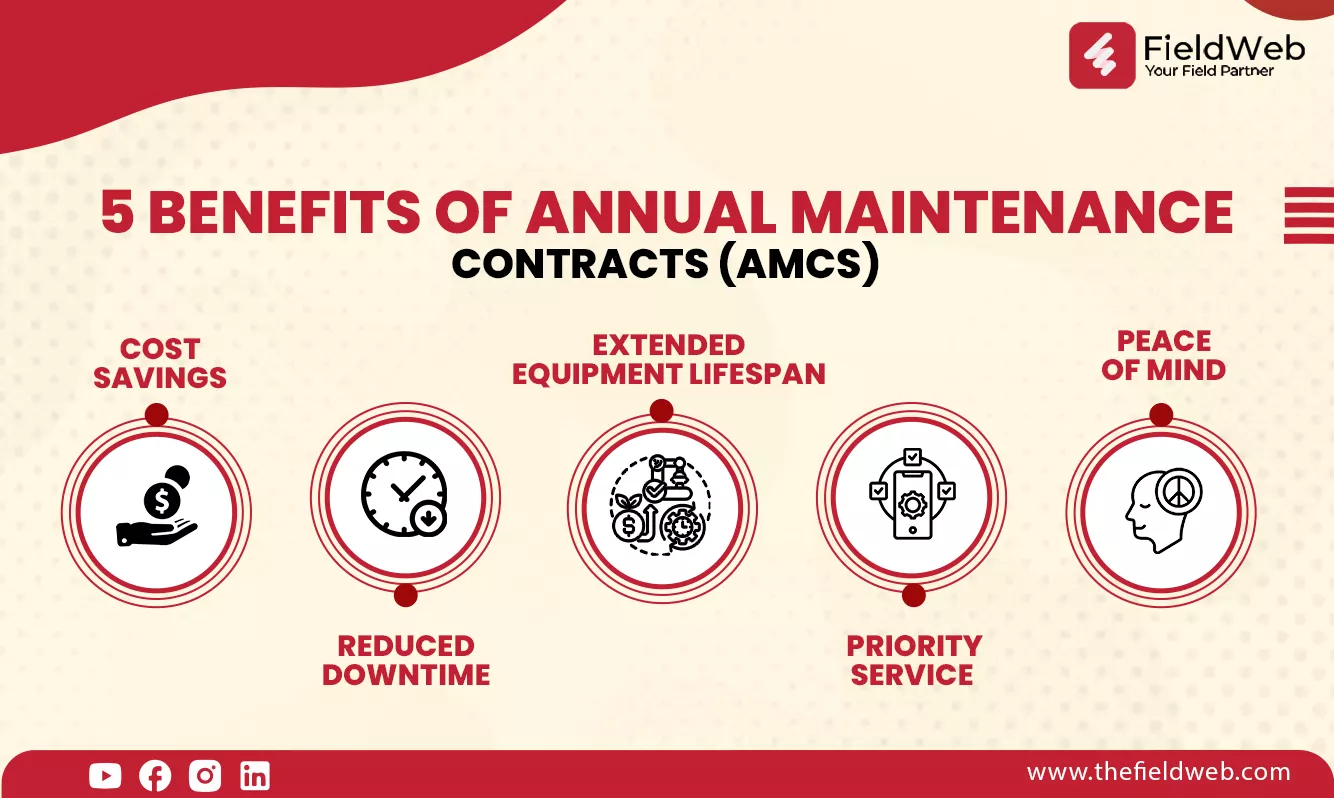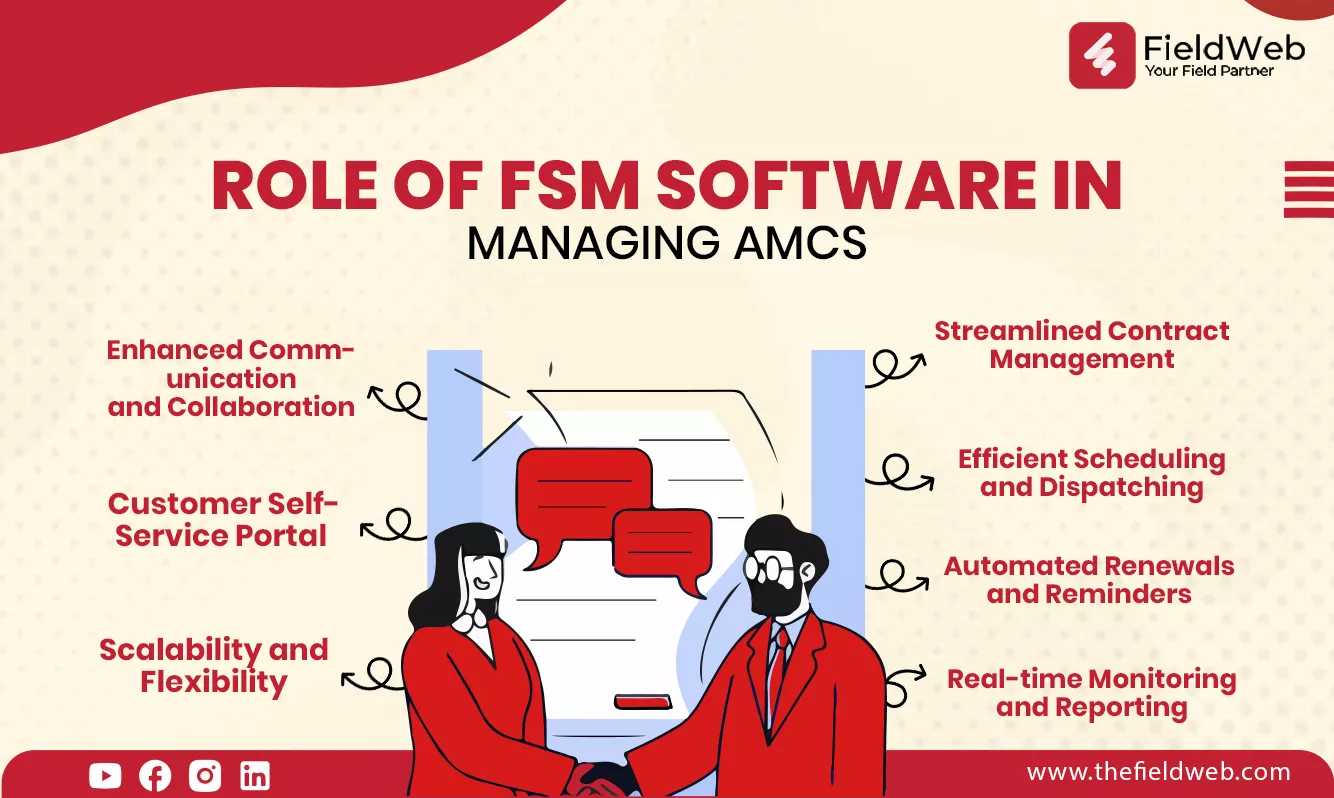
Welcome to our comprehensive guide on Annual Maintenance Contracts (AMCs). In today's fast-paced business environment, ensuring the continuous operation and reliability of equipment, machinery, software, and systems is essential for businesses to thrive. This guide aims to provide you with a thorough understanding of what AMCs are, their significance, and how they can benefit your organization.
Throughout this guide, we'll delve into the various aspects of AMCs, including their definition, benefits, types of services covered, customization options, and why they're essential for businesses of all sizes and industries. Additionally, we'll explore how integrating AMCs with Field Service Management (FSM) software like FieldWeb can streamline contract management, enhance operational efficiency, and drive business success.
Join us on this journey as we explore the world of Annual Maintenance Contracts and discover how they can be a game-changer for your organization's maintenance management strategy. Whether you're a business owner, facilities manager, IT administrator, or maintenance professional, this guide is your ultimate resource for unlocking the full potential of AMCs in today's competitive landscape.

An Annual Maintenance Contract (AMC) is a service agreement between a service provider and a client, typically for the maintenance and upkeep of equipment, machinery, software, or systems over a specified period, usually one year.
Under an AMC, the service provider commits to providing predefined maintenance services to the client, often on a regular schedule, in exchange for a fee. These services may include routine inspections, preventive maintenance tasks, repairs, troubleshooting, software updates, technical support, and access to spare parts if needed.
AMCs are commonly used in various industries where regular maintenance is essential to ensure the smooth functioning, reliability, and longevity of equipment or systems. By entering into an AMC, clients can benefit from predictable maintenance costs, priority service, reduced downtime, extended equipment lifespan, compliance with warranty requirements, and peace of mind knowing that their assets are being properly cared for by qualified professionals.
Overall, an Annual Maintenance Contract is a proactive approach to maintenance management that helps businesses minimize disruptions, optimize performance, and protect their investments in critical assets.

Maintaining your equipment and assets shouldn't be a headache. That's where Annual Maintenance Contracts (AMCs) come in. They're like your proactive maintenance buddy, ensuring your machinery, software, or systems stay in tip-top shape year-round.
Here's why AMCs are a game-changer:
AMCs might seem like just another business expense, but they're an investment in your long-term success. By ensuring the reliability and longevity of your equipment, AMCs help you avoid unexpected disruptions and maintain peak performance—all while saving you time and money in the long run.

When it comes to Annual Maintenance Contracts (AMCs), businesses have various options to choose from based on their specific needs and requirements. Here are some common types of AMCs:
1. Comprehensive AMC:- This type of AMC provides comprehensive coverage for all maintenance and repair needs of the equipment or system. It typically includes preventive maintenance, routine inspections, repairs, spare parts replacement, and technical support. Comprehensive AMCs offer peace of mind to clients by ensuring all maintenance aspects are taken care of by the service provider.
2. Non-Comprehensive AMC:- In contrast to comprehensive AMCs, non-comprehensive AMCs cover only specific maintenance services. Clients may opt for non-comprehensive AMCs if they have in-house capabilities for certain maintenance tasks or prefer to handle some aspects independently. Non-comprehensive AMCs often exclude spare parts and may have limitations on the scope of services covered.
3. Labor Only AMC:- Labor only AMCs focus solely on providing skilled labor for maintenance and repair tasks. Clients are responsible for procuring necessary spare parts and consumables separately. Labor only AMCs are suitable for clients who prefer to manage their own inventory of spare parts or have specific preferences for sourcing parts independently.
4. Preventive Maintenance AMC:- This type of AMC emphasizes preventive maintenance activities aimed at reducing the likelihood of equipment breakdowns and prolonging its lifespan. Preventive maintenance AMCs typically include regular inspections, cleaning, lubrication, adjustments, and minor repairs to keep equipment in optimal condition.
5. Corrective Maintenance AMC:- Corrective maintenance AMCs focus on addressing equipment breakdowns and faults as they occur. Clients pay for maintenance services on an ad-hoc basis, and the service provider responds to maintenance requests as needed. Corrective maintenance AMCs are suitable for clients who prioritize cost-effectiveness and prefer to pay for maintenance services only when required.
6. On-site AMC:- On-site AMCs involve technicians visiting the client's premises to perform maintenance and repair tasks on-site. This type of AMC is ideal for equipment or systems that cannot be easily transported or require specialized tools and equipment for servicing.
7. Off-site AMC:- Off-site AMCs entail maintenance and repair activities performed at the service provider's facility rather than on the client's premises. Clients may opt for off-site AMCs for equipment that can be easily transported or when on-site servicing is not feasible or cost-effective.
8. Customized AMC:- Customized AMCs are tailored to meet the specific needs and preferences of individual clients. Service providers work closely with clients to develop a bespoke maintenance plan that aligns with their unique requirements, budget constraints, and operational objectives.
By offering different types of AMCs, service providers can cater to a wide range of client preferences and provide flexible solutions that meet their maintenance needs effectively.

Here are the top 5 benefits of Annual Maintenance Contracts (AMCs):
1. Cost Savings: AMCs provide predictable, fixed-cost solutions, helping businesses budget effectively and avoid unexpected expenses associated with ad-hoc repairs.
2. Reduced Downtime: Regular maintenance visits minimize downtime by identifying and addressing potential issues before they escalate, ensuring uninterrupted operations.
3. Extended Equipment Lifespan: Well-maintained equipment lasts longer, reducing the need for premature replacements and saving on capital expenditures.
4. Priority Service: Clients with AMCs receive priority scheduling and expedited service, minimizing disruptions and ensuring prompt attention to maintenance needs.
5. Peace of Mind: With regular maintenance by qualified professionals, businesses can have confidence in their equipment's reliability, reducing the risk of unexpected breakdowns and ensuring consistent performance.

Field Service Management (FSM) software is like the secret sauce that takes your Annual Maintenance Contracts (AMCs) to the next level. Here's how it works:
1. Streamlined Contract Management: FSM software puts all your AMC contracts in one centralized location, making it easy to track and manage. No more digging through piles of paperwork or hunting down emails—it's all right there at your fingertips.
2. Efficient Scheduling and Dispatching: With FSM software, scheduling maintenance visits is a breeze. You can quickly assign tasks to technicians based on their availability and expertise, ensuring timely service delivery and optimal resource utilization.
3. Automated Renewals and Reminders: Say goodbye to manual contract renewals and missed deadlines. FSM software automates the renewal process for AMCs, sending timely reminders to both clients and technicians so no appointment falls through the cracks.
4. Real-time Monitoring and Reporting: Keep tabs on your AMC performance in real-time with FSM software. You can track service activities, monitor SLA compliance, and generate insightful reports to identify areas for improvement and optimize your operations.
5. Enhanced Communication and Collaboration: FSM software fosters seamless communication and collaboration between your team members, clients, and technicians. Everyone stays in the loop, with instant access to important information and updates, leading to smoother service delivery and happier customers.
6. Customer Self-Service Portal: Give your clients the power to manage their AMC contracts with ease. FSM software often includes a customer self-service portal where clients can schedule service appointments, view service history, and access documentation—all without having to pick up the phone.
7. Scalability and Flexibility: As your business grows, FSM software grows with you. Whether you're managing a handful of AMCs or a large portfolio of contracts, FSM software offers the scalability and flexibility you need to adapt to changing requirements and scale your operations accordingly.
In a nutshell, FSM software is your ultimate ally in managing AMCs effectively. From simplifying contract administration to optimizing service delivery and fostering better communication, FSM software empowers you to take control of your maintenance management and deliver exceptional service to your clients.
In conclusion, Annual Maintenance Contracts (AMCs) offer businesses a proactive approach to maintenance management, delivering a range of tangible benefits that contribute to cost savings, operational efficiency, and peace of mind. By investing in an AMC, businesses can minimize downtime, extend the lifespan of their equipment, receive priority service, and ensure reliable performance—all while streamlining maintenance processes and optimizing resource utilization. With AMCs, businesses can focus on driving growth and success, knowing that their assets are being well-maintained by trusted professionals.
FAQs